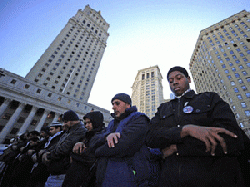NEW YORK — The New York Civil Liberties Union filed a motion in a Manhattan courtroom on Monday that aims to stop police in the Big Apple from continuing surveillance that specifically targets practicing Muslims.
In court papers filed by the NYCLU, the civil liberties group asks a federal judge to grant an injunction “against ongoing violations”perpetrated by the NYPD in which officers of the law have spied on local Muslims through the guise of an alleged counterterrorism program. Of particular target is an elusive “Demographics Unit,” a squad of NYPD officers who have surveilled local Muslims in the wake of the September 11, 2001 terrorist attacks but only exposed last year by an expose published by the Associated Press.
The NYCLU insists that surveillance waged at Muslims must stop immediately, as spying on persons not linked to a specific crime violates the terms of a historic 1985 settlement known as the Handschu agreement. In that case, the court sided with plaintiff Barbara Handschu and agreed that the NYPD violated constitutions protections granted under the First Amendment by compiling dossiers of known anti-war protesters and other political activists. Following that ruling, the NYPD has only been allowed to conduct surveillance if it suspects criminal activity.

Last year, Queens, NY resident Shamiur Rahman testified that he served as a paid informant for the NYPD for months, and visited mosques and other Muslim gathering places in order to gather intelligence. Rahman said before court that his NYPD handler, “Steve,” told him that the agency considered being a religious Muslim as an indicator of terrorism. As the AP’s investigation widened, the Demographics Unit was linked to collecting intelligence from mosques, community centers, bookshops and cafes across the greater New York region. Rahman claimed that, with his help, the NYPD was handed information
“One of my earliest assignments was to spy on a lecture at the Muslim Student Association at John Jay College in Manhattan,” Rahman testified. “I was told to report any ‘buzz words’ like jihad or revolution by the speaker. I was also told to monitor the student group itself. My NYPD boss Steve told me to take pictures at the group’s events, to determine who belonged to the group and to identify its leadership. I took pictures of people in the group and recorded the license plate numbers of their cars.”
In September, NYPD Commissioner Ray Kelly insisted, “As a matter of Police Department policy, undercover officers and confidential informants do not enter a mosque unless they are following up on a lead vetted under Handschu.” In a statement this week, NYPD spokesman Paul Browne added, “The NYPD adheres to the Constitution in all it does, and specifically the Handschu guidelines in the deployment of undercover officers to help thwart plots against New York City and to identify individuals engaged in support of terrorism.”
The NYCLU thinks otherwise, though, and is asking a federal judge to make sure the NYPD stops immediately. “We think the surveillance of innocent Muslims is an infringement of civil liberties by the police and a violation of the guidelines,” Paul Chevigny, a New York University law professor and one of five attorneys on the Handschu case, tells CNN. “There’s no indication of crime in connection with any of the organizations they’ve infiltrated,” he says.
“Investigations of any community which are not based upon indications of crime create fear and erode the confidence of a community in the power of a legal system to protect it,” Chevigny adds in a statement published by Newsday.
In the motion filed on Monday, the NYCLU writes, “When surveillance is conducted to detect crime, it will stop when the crime is stopped or the danger passes, but a surveillance program of the sort that the NYPD conducts has no end. Its pervasive injurious effects must increase as people become more aware of the surveillance. This is the essence of a police state.”






Leave a Reply